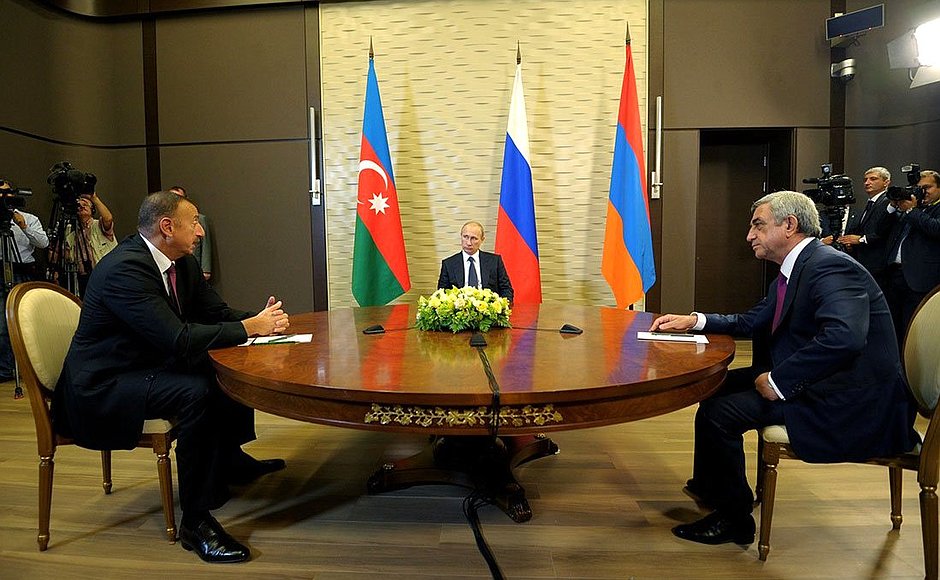
Analysis by Emil Sanamyan
The election of Donald Trump to the presidency of the United States has set the stage for political uncertainty around the world. The Caucasus states will also be scrambling to adjust.
Although a political novice, Trump has had some exposure to the post-Soviet states, as have some of the key members of his cabinet. Georgia is the only Caucasus state that Trump has visited, but its leaders appear particularly concerned about further loss of U.S. support. In Armenia and Azerbaijan, reactions have been more ambivalent. Pro-democracy activists in all three countries already have good reasons to be concerned, as Trump and his secretary of state Rex Tillerson have shown little interest in supporting democratization abroad.
As before, U.S. priorities with regard to three regional heavyweights – Russia, Turkey and Iran – will have spillover repercussions for the Caucasus. And here uncertainties abound.
First, the likely fresh “reset” in U.S. relations with the Russian president Vladimir Putin has focused on the Islamic State in Iraq and Syria (ISIS) and relaxation of the U.S. sanctions against Russia over Ukraine. The anticipated implication is reduced U.S. engagement in the former Soviet space and recognition of Russian hegemony.
Second, the Trump administration appears to harbor strong suspicions of Turkish president Recep Tayyip Erdogan’s Islamist agenda. Trump’s executive order on immigration, described by many as a “Muslim ban,” has already sparked Erdogan’s criticism.
Finally, Trump and his officials have also hinted that they might reverse the Obama Administration’s policy of lifting some of the Iran sanctions in exchange for internationally-monitored restrictions over its nuclear program.
A re-reset with Russia?
As never before, allegations of Russian meddling were a key factor in the U.S. presidential campaign, occasionally overshadowing domestic priorities. In spite of warnings from congressional Republicans, Trump has repeatedly said that he would try to “get along” with Putin and reduce U.S.-Russian tensions. A bilateral summit is said to be already in the works.
Following Trump’s election, his company announced scrapping of two licensing deals it had in the Caucasus – in Baku and Batumi. Trump appears to have little patience for small things, including small countries, and the projection of U.S. interests in the Caucasus, already in decline under Barack Obama, may further weaken.
Georgia’s ex-president-in-exile Mikhail Saakashvili, who hosted Trump in Georgia in 2012, claims continued close friendship with him. This is unlikely to help the efforts of the incumbent Georgian government, led by Saakashvili’s political opponents already worried about U.S.-Russian collusion, to engage with Trump.
Although, Donald Trump has never been to Azerbaijan, Ivanka, his daughter and probably the most important advisor, went there on a business trip in 2014. Here too, things are complicated. Trump’s local partner, the son of Azerbaijan’s transport minister, has been stripped of his business assets and relocated to the United Kingdom. Azerbaijan’s other channel to Trump is through Moscow-based billionaire Aras Agalarov, whose son used to be married to Ilham Aliyev’s daughter.
Finally, no Armenian political figures have any prior history of relations with Trump, or any of his senior appointees, and are likely as ever before to rely on the Armenian community in the United States for help with outreach.
Still an ally?
Since the bloody coup attempt last July, the Turkish government has launched a large-scale crackdown on the suspected plotters and other opponents. Some pro-government figures in Turkey have accused the U.S. government of providing support for the coup, charges that U.S. officials deny. Erdogan’s once ally and now enemy number one is Fethullah Gulen, a popular Turkish cleric who has been living in Pennsylvania since before Erdogan’s rise to power in the early 2000s. The fate of Gulen – and whether he would be extradited to Turkey as Erdogan demands – is likely to be a pivotal factor in bilateral relations.
Other factors straining relations include Trump’s rhetoric about Islamic radicalism and possibility of branding the loose network known as the Muslim Brotherhood – Erdogan’s key Middle East allies – as terrorists, as well as continued U.S. support for Syrian Kurds. At the same time, continued U.S. military presence in Turkey and likely increased U.S. military presence in Iraq and Syria will likely push Trump to find ways to cooperate with Erdogan.
Renegotiating Iran?
The three Caucasus states have moved towards greater engagement with Iran following the lifting of international sanctions in 2015. Armenia and Georgia have lifted visa requirements for Iranian citizens. President Hassan Rouhani visited Baku last August and Yerevan in December. And Georgia has sought closer energy cooperation with Iran.
Of the three states, Azerbaijan’s relations with Iran are most complex, with occasional mutual accusations of spying and interference in domestic affairs. The Aliyev regime would likely welcome a tougher U.S. approach towards Tehran that could also make it more useful to the Trump administration.
Outlook
The overall direction of President Trump’s policies is likely to leave the Caucasus three with even less room for maneuver vis-a-vis Russia than these states enjoyed under previous administrations. Some spillover is also likely from U.S. tensions with Iran and possibly also Turkey. Mainstays of America’s Caucasus policy of the last two decades, including support for pro-democracy programs, promotion of the Caspian as an energy alternative for Europe and management of the Karabakh peace process, are all now up in the air.









